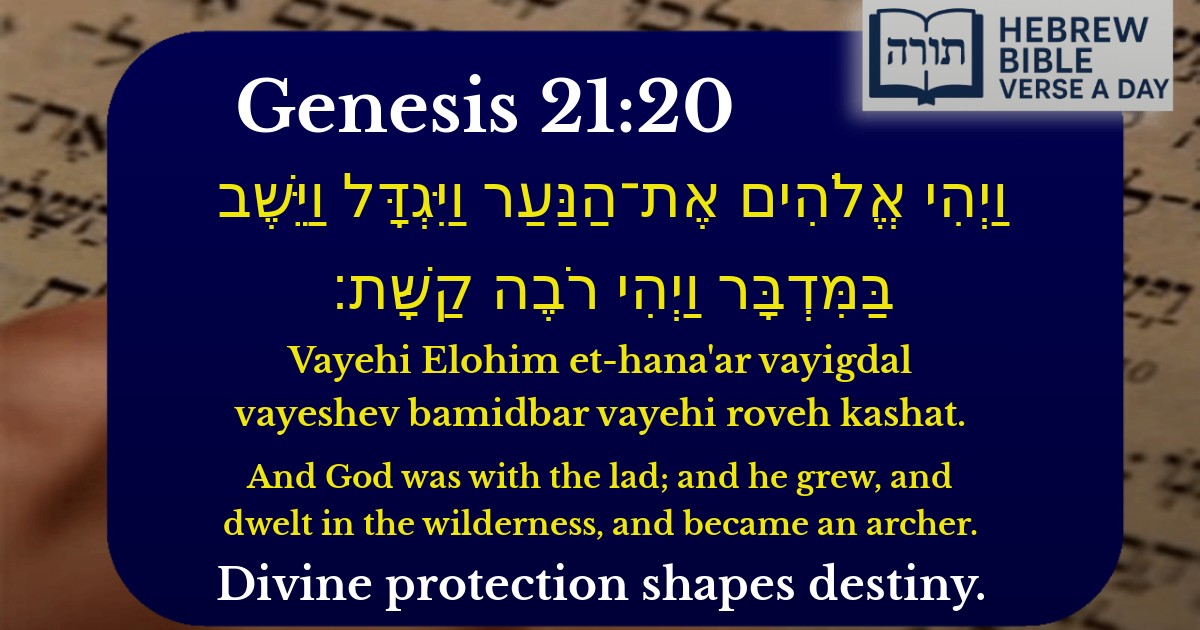Frequently Asked Questions
Q: What does Genesis 21:20 mean when it says 'God was with the lad'?
A: The verse refers to Yishmael (Ishmael), the son of Avraham (Abraham). 'God was with the lad' means that Hashem protected and guided Yishmael even after he and his mother Hagar were sent away. Rashi explains that this shows God's mercy, as He heard Hagar's prayers (Genesis 21:17) and ensured Yishmael's survival and growth in the wilderness.
Q: Why is it significant that Yishmael became an archer in Genesis 21:20?
A: The Torah mentions that Yishmael became a 'robeh kashat' (skilled archer) to show that he developed survival skills in the wilderness. Ramban notes that this was part of God's blessing, enabling him to sustain himself. The Midrash (Bereishit Rabbah 53:15) also connects this to his future descendants' traits of being skilled in warfare.
Q: How does Genesis 21:20 relate to the story of Hagar and Yishmael?
A: This verse concludes the episode where Hagar and Yishmael were sent away from Avraham's household. Despite their difficult situation, God did not abandon them. The Talmud (Rosh Hashanah 16b) teaches that Yishmael's merit (as Avraham's son) led to divine compassion, ensuring his survival and growth.
Q: What lesson can we learn from Genesis 21:20 about divine providence?
A: The verse teaches that Hashem watches over all people, even in challenging circumstances. The Sforno explains that Yishmael's growth in the wilderness demonstrates God's ability to sustain life anywhere. This reminds us to trust in divine providence, knowing that God cares for all His creations.
Q: How is Yishmael's dwelling in the wilderness (midbar) significant in Genesis 21:20?
A: The wilderness represents a place of hardship, yet Yishmael not only survived but thrived there. Rashi and Rambam highlight that this foreshadows the resilience of his descendants. The Midrash (Pirkei DeRabbi Eliezer 30) also connects this to future events, showing how God's plan unfolds through generations.


Context of the Verse
This verse (Bereshit 21:20) describes the fate of Yishmael after he and his mother Hagar were sent away by Avraham at Sarah's insistence. The Torah emphasizes that despite being cast out, Hashem did not abandon Yishmael, fulfilling His promise to Avraham that Yishmael would also become a great nation (Bereshit 17:20).
Divine Providence ("וַיְהִי אֱלֹהִים אֶת־הַנַּעַר")
Rashi explains that the phrase "God was with the lad" refers to divine protection. Even in the wilderness, Hashem ensured Yishmael's survival. The Midrash (Bereishit Rabbah 53:13) notes that angels were sent to care for him, paralleling the care given to his father Avraham in earlier narratives.
Growth and Development ("וַיִּגְדָּל")
The Ramban observes that Yishmael's growth was both physical and spiritual. Initially portrayed negatively (Bereshit 16:12), here he matures under divine guidance. The Talmud (Rosh Hashanah 16b) connects this to the concept that even descendants of Yishmael can merit divine favor through repentance.
Life in the Wilderness ("וַיֵּשֶׁב בַּמִּדְבָּר")
Ibn Ezra comments that dwelling in the wilderness shaped Yishmael's character, making him resilient. The Midrash (Pirkei DeRabbi Eliezer 30) suggests this prepared his descendants to inhabit the Arabian deserts, fulfilling the prophecy of his dwelling "before all his brothers" (Bereshit 16:12).
Skill as an Archer ("וַיְהִי רֹבֶה קַשָּׁת")
Rashi interprets "archer" both literally and metaphorically:
- Literally: He mastered hunting for sustenance in the wilderness
- Metaphorically: He became skilled in "shooting" accusations against Yitzchak (referencing later tensions)
The Kli Yakar adds that this skill symbolized his independence and self-sufficiency under God's watchful eye.Theological Implications
The Sforno emphasizes that this narrative demonstrates Hashem's faithfulness to His promises, even to those outside the chosen line of Yitzchak. The verse balances justice (Yishmael's removal from Avraham's household) with divine mercy (his ongoing sustenance and growth).